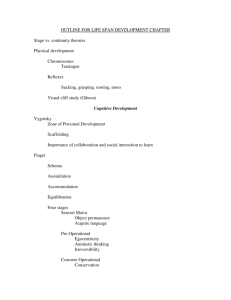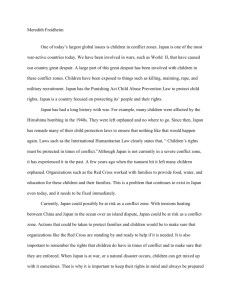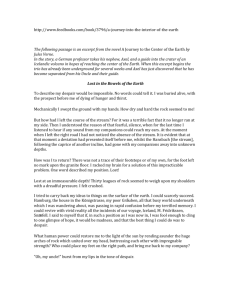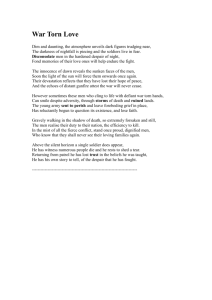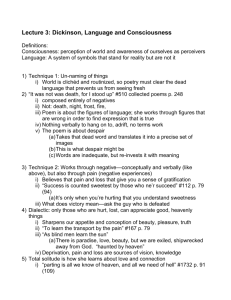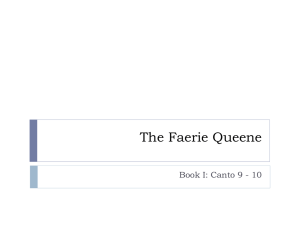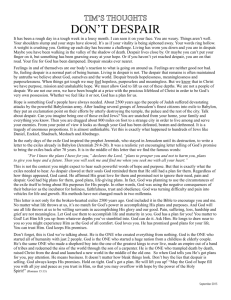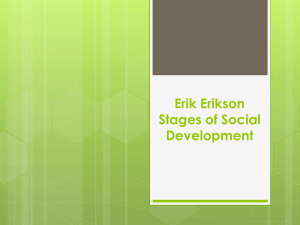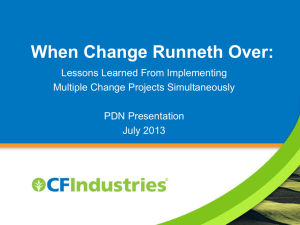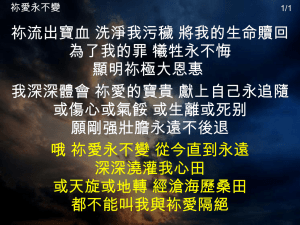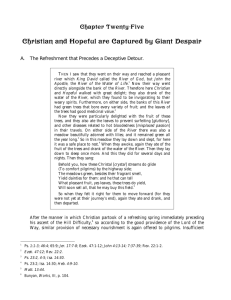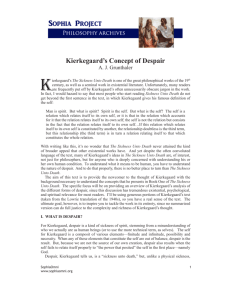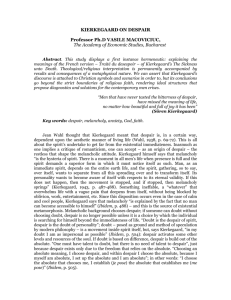HOPE IN AN AGE OF DESPAIR
advertisement
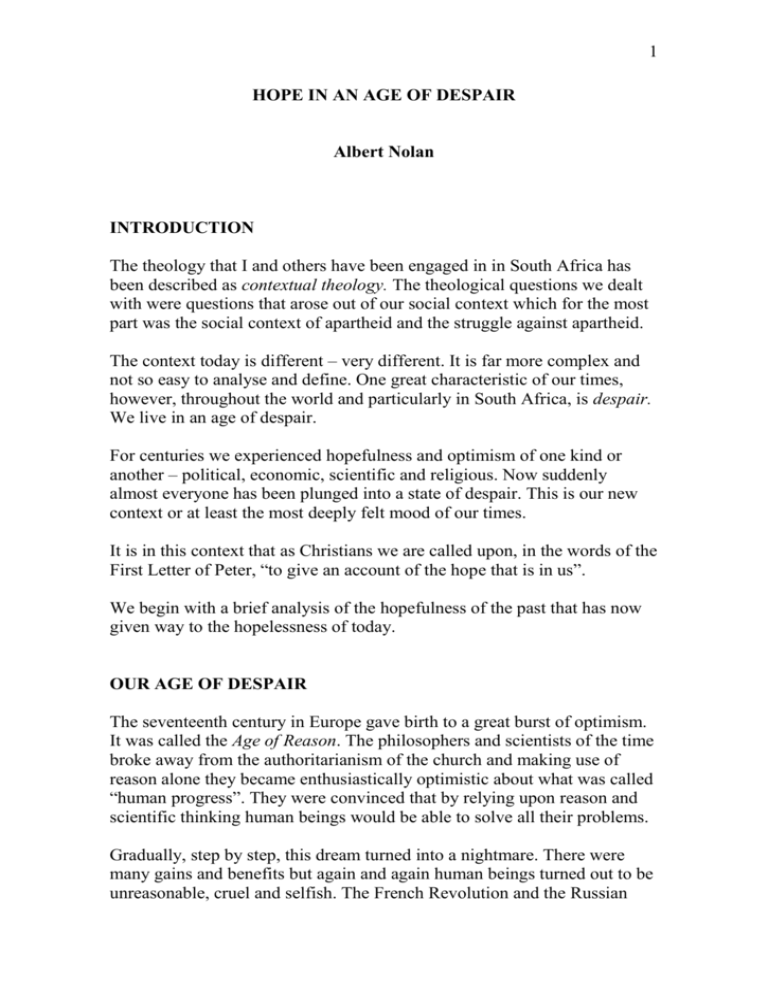
1 HOPE IN AN AGE OF DESPAIR Albert Nolan INTRODUCTION The theology that I and others have been engaged in in South Africa has been described as contextual theology. The theological questions we dealt with were questions that arose out of our social context which for the most part was the social context of apartheid and the struggle against apartheid. The context today is different – very different. It is far more complex and not so easy to analyse and define. One great characteristic of our times, however, throughout the world and particularly in South Africa, is despair. We live in an age of despair. For centuries we experienced hopefulness and optimism of one kind or another – political, economic, scientific and religious. Now suddenly almost everyone has been plunged into a state of despair. This is our new context or at least the most deeply felt mood of our times. It is in this context that as Christians we are called upon, in the words of the First Letter of Peter, “to give an account of the hope that is in us”. We begin with a brief analysis of the hopefulness of the past that has now given way to the hopelessness of today. OUR AGE OF DESPAIR The seventeenth century in Europe gave birth to a great burst of optimism. It was called the Age of Reason. The philosophers and scientists of the time broke away from the authoritarianism of the church and making use of reason alone they became enthusiastically optimistic about what was called “human progress”. They were convinced that by relying upon reason and scientific thinking human beings would be able to solve all their problems. Gradually, step by step, this dream turned into a nightmare. There were many gains and benefits but again and again human beings turned out to be unreasonable, cruel and selfish. The French Revolution and the Russian 2 Revolution became violent and oppressive. Nazi Germany became thoroughly inhuman. Colonialism was anything but reasonable and progressive. Today very few people would still believe that science, technology and reason alone will solve all our problems. In South Africa an enormous amount of hope was generated by the struggle itself and by its success in dismantling apartheid, by the negotiated settlement, by the relatively peaceful transition to democracy, by our new constitution and by the charismatic leadership of Mandela. But since then our hopes have been gradually eroded and today the general mood can only be described as disillusionment and despair. Earlier on, throughout the world, many millions had based their hope for the future on the development of a socialist world of equality and sharing. But as Communist governments in Eastern Europe and the Soviet Union became more totalitarian and oppressive, and eventually collapsed, this hope was dashed to the ground too. Then we have the age of capitalistic expansion and the free market economy. The market, it was said, would solve all our problems provided we didn’t interfere with it or regulate it. The prospect of limitless economic growth and economic development throughout the world created an amazing amount of hopefulness – for some people. It lasted quite a long time. But now, that bubble has also burst as banks fall and economies falter because the market has failed us. For some people this is just one more reason to despair, especially since it means that the poor will get poorer even faster than before. In the church too, there is a growing feeling of despondency. The Second Vatican Council had filled many of us with hopeful excitement about the future of the church. It seemed as if we were beginning to move away from an authoritarian, hierarchical church to the radical freedom of Jesus and the gospel. But since then almost all the gains of the Council have slowly but surely been undermined and reversed. Add to this the sex scandals and the way they were covered up by the church together with the present lack of vocations to the priesthood and religious life, and what you have is a formula for demoralisation and despair. However, not everyone is in a state of despair. There are some signs of hope like the new pro-poor governments in Latin America (Bolivia, Ecuador, Paraguay, Venezuela and Brazil) and the election of Barack 3 Obama in the USA. But on the whole the signs we see point to yet greater doom and gloom, to yet more suffering and misery for the poor. Looming over all of this like a dark threatening cloud is the reality of global warming and climate change, and the lack of sufficient political will to make the necessary changes to save the planet. Those who work in this area of concern are beginning to doubt that human life will survive on this planet let alone other forms of life. However, what I want to argue is that this shift from hope to hopelessness is not a disaster. It is a magnificent new opportunity for the development of genuine Christian hope. CHRISTIAN HOPE For a genuine Christian there is hope. There is always hope. In the words of Paul, we hope against hope, that is to say, we remain hopeful even when there appear to be no signs of hope at all. Why? Because our hope is not based upon signs. Our hope is based upon God and God alone. We put all our hope and trust in God. Or at least we try to. But what does it mean to put all one’s hope and trust in God? That is the major theological question of our time. It is a particularly difficult question because for very many people today God is dead or irrelevant, a meaningless concept. To many putting all one’s hope and trust in God sounds like a pious cop-out. What does it mean then to trust God? In the first place, to quote from Psalm 146, it means that we do not put our trust in princes. “Do not put your trust in princes, in mortals in whom there is no help. … Happy are those … whose hope is in the Lord their God” (146:3,5). We cannot rely upon the promises of princes: political princes or industrial princes or even princes of the church. It is obviously helpful to have good leaders, but ultimately we cannot base our hope for the future upon human leaders of any kind. Not only because all humans including ourselves are fallible, weak and liable to make mistakes, but more importantly because none of us, individually or together, is powerful or all-knowing enough to save the world. 4 Nor can we put all our hope and confidence in human institutions of any kind: political parties, churches, governments or electricity suppliers like Eskom. They can all flounder and fail. Nor can we base our hope for the future upon any kind of ideology: the ideologies of socialism or the free market or even democracy. To put all one’s hope and trust in God means that while we might value and appreciate the contribution of princes and institutions and ideologies, in the end we simply do not treat them as the absolute and unshakeable basis of our hopes for the future. Just how unreliable all these things are is precisely what we are beginning to discover today. The final temptation is to trust nobody but ourselves. I am the only one who knows what is best for the world. If only they would all just listen to me. On the other hand if we don’t trust anyone or anything, not even our own ideas, life becomes completely impossible. I have to put some measure of trust in the pilot who flies the plane or the scientists who prepared the medicine I take or the doctor who diagnoses my illness. They are not infallible and I take a calculated risk when I trust them. But in the final analysis I cannot put all my hope and trust in any of them, nor even in myself. Of course there are people whose trust in God is unhealthy too. It can become a cop-out, a way of escaping the need to act, to act wisely and vigorously. Much depends on how we see God as we will see later. But much also depends upon what we are hoping for. We live in an age of despair not only because people had built their hopes upon shaky foundations, but also because many of us had been hoping for all the wrong things. 5 WHAT DO WE HOPE FOR? The object of Christian hope is the coming of God’s Kingdom or God’s reign on earth. In the Our Father we pray; “Thy Kingdom come; thy will be done on earth”. Our hope is that God’s Will be done on earth. Many people today will find the idea of God’s Will difficult to appreciate. Others will be all to ready to think they know exactly what God wants and what God’s Kingdom will be like. But there is one thing we can be sure of: God’s Will is not arbitrary. When we speak about my will we are often referring to something arbitrary, my arbitrary choice about what ought to be done. To impose that upon others would be decidedly oppressive. But God’s Will is different. God’s Will might best be translated as “the common good”. What God wants is whatever is best for all of us together, whatever is best for the whole of creation. Of course it is not always easy for us to appreciate what is best for everyone, but if our attempts are to do, as far as possible, whatever is for the common good, then we are doing God’s Will and to that extent God’s Will is being done on earth. Some people will assume that what is best for everyone will not be best for me as an individual, and that what is best for me will clash with the needs of others or the common good. That is not true. What is best for everyone is also best for me. In other words God’s Will is a way of saying that what is best for everyone is best for me too – even if I find it very difficult to do. The object of Christian hope then is the common good. The problem with the hopefulness of the past is that it was too often a hope for something that would not have served the common good of all human beings and all of creation. The object of these hopes has been too often selfish and self-serving, ego-centric and narrow-minded: hopes for a better future for myself, my family and my own country at the expense of other people; hopes for economic growth and a higher standard of living for some regardless of others. That is not God’s Will or the common good. 6 TRUSTING GOD’S WORK When we work for the common good, and many people are doing that all over the world, then our work becomes a participation in God’s Work. We have seen that as Christians the basis of our hope is God and the object of our hope is God’s Will. But perhaps it would be more helpful to say that what we rely upon is God’s Work. God is at work in the whole universe and always has been. It is God who has brought everything into existence and keeps everything moving forward in the immense unfolding of the universe. God has been at work in all of human history and continues to be involved in the world of politics, economics and religion – not to mention what we call “nature”. And last but not least, God is at work in you and me. There is no area of life from which God can be excluded. That does not mean that everything is good and that we are not responsible for what happens in our lives. There is obviously much that is wrong and we might even say evil. But God remains involved in ways that are supremely mysterious. Ultimately the cause of all that is wrong or sinful or evil is human selfishness. We cannot go into that now, but we can take heart from the belief that God is at work nevertheless and in a way that will change all that eventually when God’s Will is done on earth as it is in heaven. God’s Work cannot fail. It is totally reliable. Christian hope then, the hope that Jesus taught us, means relying completely on God’s Work in all things, that is to say, it means relying upon the goodness of the great unfolding of the universe of which we are a part. 7 WHERE IS YOUR GOD? In the final analysis everything depends upon our belief in God and God’s Great Work. Hope is based upon faith – belief in God. If our faith is weak, our hope will be shaky too. As Jesus said again and again: “Your faith has saved you or will save you”. The problem today is that it is not easy to believe in God or rather to understand what belief in God might mean. However, some things about God are becoming clearer. For example with regard to the great problem of suffering in the world we have moved from seeing God as the cause of this suffering, to seeing God as the one who allows people to suffer, to seeing God as the one who is suffering with us. God is to be found amongst the victims of injustice, those who are sinned against, the poor and the marginalized, the sick and the outcasts. That is the meaning of the crucifixion. Jesus was a victim of human cruelty. He was the one who was sinned against. But what is the use of a powerless, suffering God. How can we put all our hope and trust in such a God? We can and must, because God is powerful, all-powerful, not with the power of force or coercion, but with the power of compassion and love. The oppressive power of brute force and violence can never be the basis of Christian hope. It is not God’s power. It is not God’s way of acting. And yet it is so often what we expect God to do – to use brute force and violence to solve the world’s problems. As I said earlier, we hope against hope. We continue to hope even when there are no visible signs of hope. We recognise the darkness and apparent hopelessness of the present situation and put all our trust in God. Then, gradually, as our eyes adjust to the darkness of despair, we begin to see the emerging shapes or outlines of God’s great and mysterious work - the finger of God, as Jesus called it. These are the paradoxical signs of the time that only become visible once we believe that God is at work in our world, once we learn to look at life with an attitude of hopefulness. 8 We have time for only a few random examples. A leading peace activist says that the much publicised war in Iraq has led to an exponential increase in the number of people actively involved in the peace movement worldwide. Is this the finger of God drawing good out of evil? The terrible suffering of so many people in violent conflicts, earthquakes, tsunamis and pandemics like HIV/AIDS may give rise to despair in some but it also elicits huge waves of compassion. What the world needs more than anything else is more compassion. Is this the enigmatic work of God? The recent collapse of so many banks in the USA and elsewhere has been universally attributed to the greed of the super rich. Up until now the super rich were heroes. They had made it to the top. But now it is not only the poor who see them as the culprits, the criminals whose greed we all have to pay for. Is that kind of discovery the work of God’s mysterious providence? The reaction of so many Catholics to the sex abuse scandals, their concern about the victims and about the callousness of some church leaders, has contributed powerfully to a new awareness of how much the church needs to change. Was this perhaps a happy fault, a blessing in disguise? And would Barack Obama’s call for change have received such a tremendous response in America and elsewhere if it had not been preceded by the fumbling stupidity of George Bush. But most of all I wonder if the present age of despair is not being used by God to challenge us to take God more seriously as the only basis for hope in the world. Is God writing straight again with crooked lines as Augustine once said? Not that I wish to suggest that the finger of God emerges only in such paradoxical changes. If we keep searching in the dark with complete trust in God who knows what might appear. We might begin to see tiny mustard seeds that are beginning to grow into huge trees. What matters in the long run, though, is not only that we are hopeful but that we act hopefully, that we do whatever we can with confidence and hopefulness. What would be tragic at this time would be that we give up hope and stop trying to work for a better world, or that we carry on working but without any hope. 9 Perhaps the most valuable contribution that a Christian can make in our age of despair is to continue, because of faith, to act hopefully, and in that way to be an encouragement to those who have lost all hope. The most valuable contribution that a theologian could make would be to help people to come to a more profound appreciation of God and God’s Work in the world.
